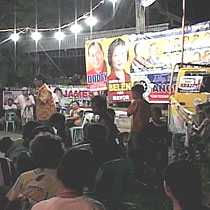-
(单词翻译:双击或拖选)
Zamboanga Del Norte, Philippines
16 May 2007
Philippines elections are traditionally violent and costly1. On May 14th, millions of voters in the Philippines went to the polls to fill more than 18,000 local and national positions. The final results will be announced by the end of the month. VOA takes a look at the campaign in a remote province of the country. For producer Prospero Laput, VOA's Heda Bayron has more.
Elections in the Philippines are fought with money and guns, despite a police officer's warning to a driver that guns are banned in this area.
More than one hundred campaign workers and candidates were killed in the weeks before the election.
 |
| Philippine campaigning in remote villiages |
One politician says the solution to poverty is the candidate he favors for provincial2 governor -- Berto Uy. Uy has been the mayor of the provincial capital, Dipolog City. In running for governor of Zamboanga del Norte, Uy boasts of his record of building infrastructure3.
But paving roads has made him a target of allegations of corruption4 because his family is engaged in the construction supply business. Uy dismisses these allegations and says he has only answered the needs of the people.
He says, in impoverished5 areas, the number one problem is a lack of good roads. The lack of transportation infrastructure, Uy says, means a coconut6 farmer will lose about 40 percent of potential sales.
A small village in the province has not been reached by either electricity or paved roads. Around noon when it is too hot to farm, many people there gather to bet what little they have in card games.
Dario, a father of four, lives in a small hut. When asked about how he picks a candidate, he says simply he will choose the one likely to win.
Candidates most likely to win are those with massive campaign organizations and the money to meet the financial demands of running.
But not all candidates are willing to sink fortunes into campaigning.
"In this country we pay a lot of money for exposure that I find immoral7 considering the fact that people remain hungry,” says Doctor Martin Bautista, a senate candidate. “I find it immoral to spend, like, $20,000 U.S. on a 30-second commercial on TV just to make ourselves known."
Bautista is a physician who became well off working in the United States. He moved back to the Philippines with his family to prove that there is hope for improving the political process. But his campaign for the Senate only proved what he already knew -- politics here is often about money, not policy.
"It has become a cottage industry in the Philippines to become a politician,” he says. “And that's why it has become personal; it's become violent because members of somebody's family depend on the master politician for livelihood8."
Democracy is prized in the Philippines. As many as 80 percent of those eligible9 voted in the May 14th election. But many people say the electoral process does little to help the poorest in the country, such as Dario, who says he cannot worry too much about politics.
He says, as long as we eat, that is enough.
 收听单词发音
收听单词发音
1
costly

|
|
| adj.昂贵的,价值高的,豪华的 | |
参考例句: |
|
|
|
2
provincial

|
|
| adj.省的,地方的;n.外省人,乡下人 | |
参考例句: |
|
|
|
3
infrastructure

|
|
| n.下部构造,下部组织,基础结构,基础设施 | |
参考例句: |
|
|
|
4
corruption

|
|
| n.腐败,堕落,贪污 | |
参考例句: |
|
|
|
5
impoverished

|
|
| adj.穷困的,无力的,用尽了的v.使(某人)贫穷( impoverish的过去式和过去分词 );使(某物)贫瘠或恶化 | |
参考例句: |
|
|
|
6
coconut

|
|
| n.椰子 | |
参考例句: |
|
|
|
7
immoral

|
|
| adj.不道德的,淫荡的,荒淫的,有伤风化的 | |
参考例句: |
|
|
|
8
livelihood

|
|
| n.生计,谋生之道 | |
参考例句: |
|
|
|
9
eligible

|
|
| adj.有条件被选中的;(尤指婚姻等)合适(意)的 | |
参考例句: |
|
|
|















